
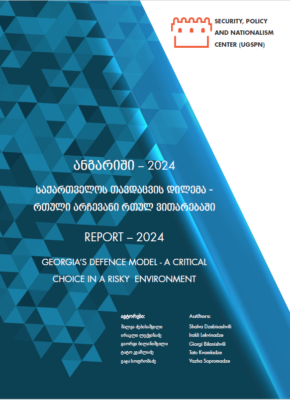 საქართველოს თავდაცვის დილემა – რთული არჩევანი რთულ ვითარებაში
საქართველოს თავდაცვის დილემა – რთული არჩევანი რთულ ვითარებაში
ანგარიში მიმოიხილავს საქართველოს თავდაცვისა და უსაფრთხოების პოლიტიკის დაგეგმვის სფეროებში არსებულ მდგომარეობს, აკეთებს ამ სფეროებში არსებული ძირითადი პრობლემების კომპლექსურ ანალიზს, როგორც შიდა, ისე გარე ფაქტორების გათვალისწინებით და გვთავაზობს ხედვასა და რეკომენდაციებს ამ ნაკლოვანებების აღმოფხვრისთვის, მათ შორის, თავდაცვის ოპტიმალური მოდელის სახით.
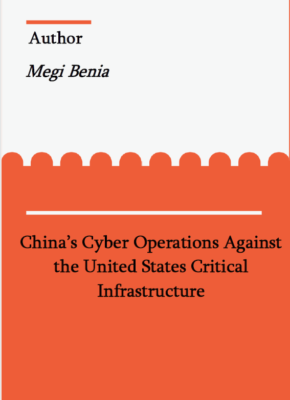 China’s Cyber Operations Against the United States Critical ...
China’s Cyber Operations Against the United States Critical ...
In 2024, the U.S. officials and government agencies openly accused China of conducting dangerous cyber operations against the country’s critical infrastructure (CI). The U.S. military and intelligence agencies believe that China’s cyber activities can distract the U.S. ability “to project, or defend against, military action”. By initiating cyber-attacks against and preposition malware in U.S. CI facilities in close proximity of the U.S. military bases, China might be preparing for several possible scenarios, including an unexpected cyber-attack against the U.S. critical military infrastructure, which might amount to the scales of the Pearl Harbor attack of 1941. If successful, current cyber activities conducted in peacetime can disrupt the U.S. ability to properly perform its military functions during the war or crisis.
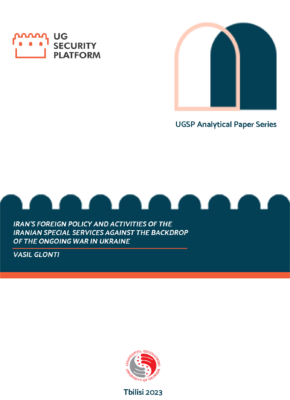 Iran’s Foreign Policy and Activities of the Iranian ...
Iran’s Foreign Policy and Activities of the Iranian ...
Vasil Glonti
Executive Summary
After the start of the Russia-Ukraine war, Iran became very active in the foreign political arena. The political and military elite of this country considered that the mentioned conflict would change the geopolitical configuration of the world, so Iran would need strategic visions and an action plan adapted to the new reality. In its foreign policy, the regime of the Iranian Mullahs identified as the main priorities: activation and expansion of cooperation with Russia, especially in the military-industrial, economic and banking-financial fields; further development of Iran's nuclear program; arranging relations with the countries of the Middle East region and giving priority to the regional security format; strengthening political-economic and military expansion in Syria, Yemen, Iraq and Lebanon; deepening of confrontation with the USA and Israel in the Middle East and different regions of the world; pursuing an aggressive policy towards Azerbaijan and neutralizing the influence of Israel; expansion of strategic relations with Armenia;
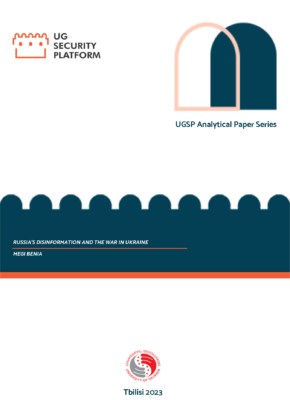 Russia’s Disinformation and the War in Ukraine
Russia’s Disinformation and the War in Ukraine
Megi Benia
Executive Summary
Russia’s war of aggression against Ukraine has proven unsuccessful in many unexpected directions and the disinformation campaign with the aim of spreading the false narratives about its military engagement in Ukraine is among them. A general overview of respective events and moves has shown that Russia has been forced to adjust its approach on disinformation and increase its focus on the domestic audience. The article aims to demonstrate that in these efforts, Russia tries:
At the international level, Russia attempts:
After providing specific facts that support the existence of these patterns, the article tries to explain the reasons behind Russia’s changed behaviours and claims that it was caused by:
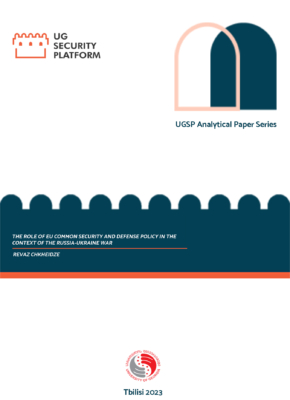 The Role of EU Common Security and Defense ...
The Role of EU Common Security and Defense ...
Revaz Chkheidze
Executive Summary
Over the years, the EU's Common Security and Defense Policy (CSDP) has evolved with challenges. At the same time, the scope of CSDP was gradually expanding, which required closer work with partners. New challenges were reflected in the EU Global Security Strategy adopted in 2016, which further highlighted the issue of the EU's strategic autonomy in the international arena.
In the wake of other fundamental documents, in 2022 the European Union developed a "Strategic Compass", which was given additional burdens by the Russia-Ukraine war. In fact, for the first time, it clearly defines the measures of the future defense and security policy of the European Union. The European Peace Facility (EPF) was established as another important, but this time, financial mechanism for the implementation of the security and defense policy, which is actively used in the context of the aid allocated to Ukraine by the European Union.
The involvement of third countries in the common foreign and security policy of the European Union is supported by the relevant mechanisms, which also underwent a considerable evolution, which was accelerated by the process of adequately re-evaluating the international relations situation on the part of the European Union.
As a result of Russia's full-scale military intervention in Ukraine in February 2022, the EU completely changed its approaches and cautious attitude in terms of assistance to the military component of Ukraine, which was caused by Russia's rude and brazen crossing of red lines in international relations that existed even before the war.
Since the beginning of the Russia-Ukraine war, the financial aid allocated by the European Union to Ukraine for military purposes amounted to 3.1 billion euros, in addition to bilateral aid. Along with this, the Military Assistance Mission for Ukraine (EUMAM) was launched, within the framework of which up to 15,000 soldiers of the Armed Forces of Ukraine will be trained mainly in Poland, as well as in Germany. Overall, it is the first time, the EU directly provides military aid to a third country.
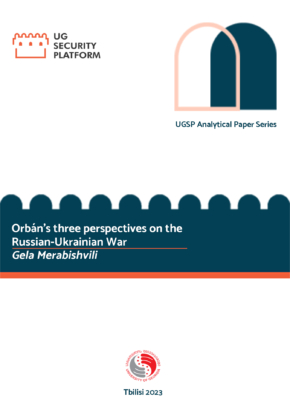 Orbán’s three perspectives on the Russian-Ukrainian War
Orbán’s three perspectives on the Russian-Ukrainian War
Gela Merabishvili
Hungary stands out from other Eastern and Central European states in the context of the Russian-Ukrainian War. While Poland, Slovakia and the Czech Republic have provided plenty of political and military support to Ukraine and significantly reduced economic ties with Russia, Hungary’s Fidesz-led government has tried to maintain trade and diplomacy with Moscow while showing only tepid solidarity with Ukraine. This article explains the reasons behind Hungary’s particular position by analyzing Prime Minister Viktor Orbán’s discourse.
By categorizing Orbán’s discourse into local, national and global geographical scales, the article identifies three main factors shaping the Hungarian response to the war:
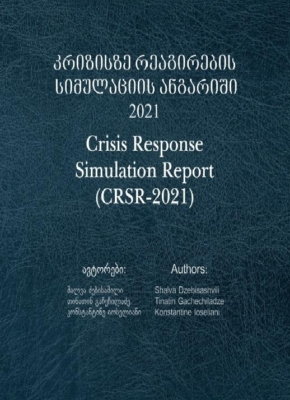 კრიზისზე რეაგირების სიმულაციის ანგარიში 2021
კრიზისზე რეაგირების სიმულაციის ანგარიში 2021
2021 წელს საქართველოს უნივერსიტეტმა პირველად ქართულ აკადემიურ სივრცეში ჩაატარა სამდღიანი პრაქტიკული სწავლება - “Crisis Simulation and Response 2021” სხვადასხვა სახელმწიფო უწყებების წარმომადგენელთა და სტუდენტების მონაწილეობით. სიმულაციის მიზანს წარმოადგენდა კრიზისული ვითარების გათამაშების შედეგად შესაძლო პრობლემური სფეროების იდენტიფიცირება და შესაბამისი რეკომენდაციების მომზადება. სწავლებისას წინასწარ შემუშავებული სცენარით გათამაშდა კრიზისული ვითარება. სცენარის თანახმად, კრიზისი ვითარდებოდა სამ ფაზად, გააჩნდა თანდათანობით დამძიმების ტენდენცია, რომელიც ბოლო ეტაპზე სამხედრო აგრესიითა და ფართომასშტაბიანი სამხედრო მოქმედებებით სრულდებოდა.
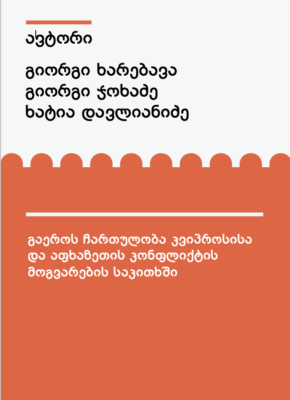 გაეროს ჩართულობა კვიპროსისა და აფხაზეთის კონფლიქტის მოგვარების საკითხში
გაეროს ჩართულობა კვიპროსისა და აფხაზეთის კონფლიქტის მოგვარების საკითხში
წინამდებარე კვლევის მიზანია, აჩვენოს, რაში გამოიხატებოდა გაეროს ჩართულობა და როლი ორივე კონფლიქტის ყოვლისმომცველი და სიცოცხლისუნარიანი მოგვარების საქმეში, გამოკვეთოს ამ ორ შემთხვევას შორის არსებული მსგავსება-განსხვავებები და დაადგინოს არსებული განსხვავებების მიზეზები.